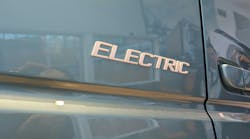Natural gas vehicle announcements from fleets reaching major milestones have become a near weekly occurrence. UPS announced that its fleet of over 7,000 alternative fuel and advanced technology vehicles has achieved its goal of driving 1 billion mi., one year earlier than it set out, and has displaced over 12% of the conventional diesel it previously used.
PepsiCo’s Frito-Lay division, the seventh largest commercial fleet in the U.S., announced that its compressed natural gas (CNG) truck fleet has reached more than 100 million mi. across the U.S. and grown its fleet from 16 to over 500 CNG vehicles over the last six years, resulting in a 30% reduction in diesel fuel use.
The most recent announcement comes from Ryder System Inc., a commercial fleet provider that says its fleet of natural gas vehicles, using both compressed and liquefied natural gas, has surpassed 100 million mi. of operations, replacing approximately 15.4 million gals. of diesel fuel.
These announcements illustrate the momentum and success of domestically produced natural gas as an alternative fuel to diesel for fleet operations. These fleets have demonstrated that the commitment to cleaner burning fuels and fleet sustainability can and will pay off.
“CNG freight trucks emit 23% fewer GHG tailpipe emissions than similar diesel.”
CNG freight trucks emit 23% fewer greenhouse gas tailpipe emissions than similar diesel freight trucks. Michigan-based UBCR LLC, a beverage container recycling company, says that by operating a natural gas vehicle fleet since 2011, it has reduced its greenhouse gas emissions by approximately 2,704 metric tons of carbon-dioxide equivalent and has displaced over 1 million gals. of diesel fuel with lower emission, domestically produced natural gas. In accounting for Ryder’s entire fleet of natural gas vehicles, over 35,000 metric tons of carbon-dioxide equivalent of greenhouse gas emissions have been eliminated by transitioning away from diesel.
UPS’s long-term commitment and continued investment in sustainability has transformed freight transportation and logistics while creating growth in the alternative fuel market nationwide. UPS has looked to more than just natural gas in powering its fleet—everything from electric and hybrid-electric to renewable natural gas and renewable diesel. Regardless, UPS has put innovation and sustainability first, allowing long-term investments to pay off.
Fleets that have adopted alternative fuels such as natural gas are seeing big wins when it comes to meeting corporate environmental performance goals and reducing their overall carbon footprint.
These tremendous reductions in greenhouse gas emissions have been made possible through government policies and funding that have incentivized the development and use of alternative fuel technologies. For example, GNA worked with UPS and Ryder to win grant funding that provided the capital for some of their first natural gas trucks and fueling station development.
Natural gas has proven to be a cost-effective transition for fleets to move away from higher polluting diesel fuel. The next evolution for natural gas vehicle fleets will be in adopting renewable forms of natural gas, such as converted landfill gas, providing even deeper greenhouse gas emission reductions. The current natural gas infrastructure and engine technology can adapt to renewable natural gas with very few to no barriers. Fleets such as Ryder and UPS have already begun this transition; however, production will need to increase to keep up with demand.


